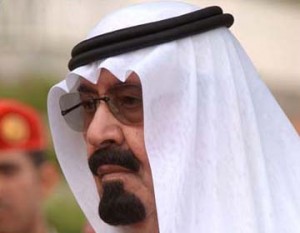 Saudi Arabia’s elderly monarch, who traveled to the U.S. earlier this week to seek medical care after being hospitalized late last week, successfully underwent back surgery at New York Presbyterian Hospital, the royal court said Wednesday.
Saudi Arabia’s elderly monarch, who traveled to the U.S. earlier this week to seek medical care after being hospitalized late last week, successfully underwent back surgery at New York Presbyterian Hospital, the royal court said Wednesday.
“A blood accumulation was removed, a slipped disk was adjusted, and an affected vertebral body was stabilized,” the royal court said in a statement.
King Abdullah bin Abdelaziz al-Saud, believed to be 86 years old, left for New York Monday to treat a slipped spinal disc, which caused a blood accumulation that put pressure on some nerves. He had earlier handed over power temporarily to Crown Prince Sultan, the king’s brother, who also serves as defense minister, until his return to the top oil exporter.
The 85-year-old Sultan, who has suffered his own serious health problems, arrived in the kingdom the same day after a long break in Morocco.
But the limited information about the king’s ailment over the weekend fanned speculation of a more serious problem with the health of the ruler of the Arab world’s largest economy. The king has in recent days farmed out some of his responsibilities as head of state to key deputies. A Saudi official familiar with the king’s health issues said that he wasn’t in serious condition.
“He is recovering and is in a stable condition,” he said.
A government announcement published last week said that one of King Abdullah’s sons was taking over as head of the country’s National Guard, one of the three top security forces in the country and the force that has traditionally been responsible for security of the royal family itself.
King Abdullah also turned over to another brother, Prince Nayyaf, his deputy crown prince and interior minister, his duties overseeing the Haj, the just-ended annual Islamic pilgrimage to holy sites in Saudi Arabia. King Abdullah’s most coveted honorific is “Custodian of the Two Holy Mosques,” a reference to the places of worship sanctified by the Prophet Mohammed during the early days of Islam.
The royal family is firmly in control of all levers of the state, so the monarch’s health setbacks don’t typically raise worry about internal political or oil-market stability. Still, King Abdullah has been credited with significant social reform and with cracking down hard on home-grown Islamist terrorists.
A decade ago, the kingdom was considered a breeding ground for radical Islamist jihadists. But after an internal crackdown under King Abdullah, it’s now a more trusted ally in the global fight against terrorism.
The issue of succession in Saudi Arabia is a murky one. Two of the king’s brothers, Sultan and Nayyaf, hold the titles of crown prince and deputy crown prince, respectively. But there is no fixed protocol about who will rule next, in the event of King Abdullah’s demise or incapacitation. WSJ

Leave a Reply
You must be logged in to post a comment.